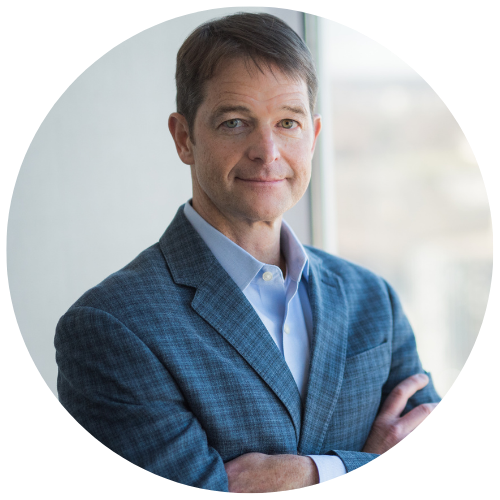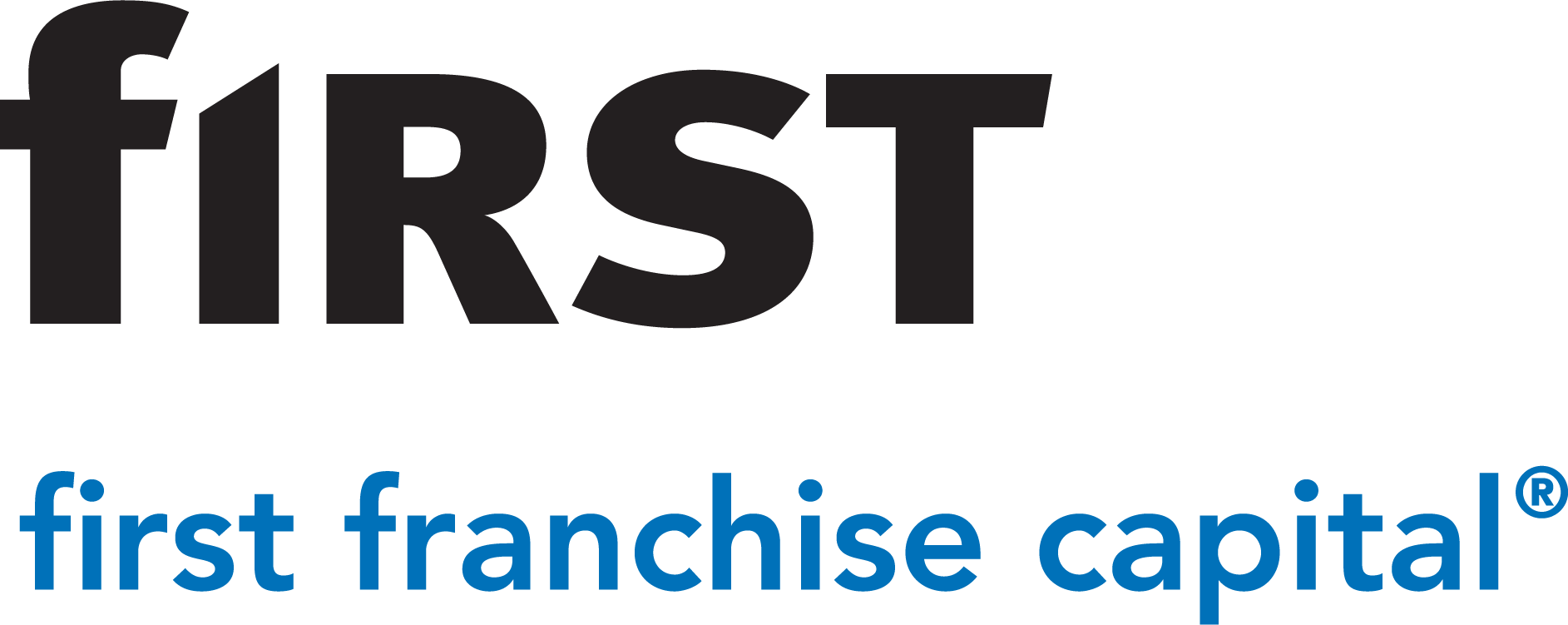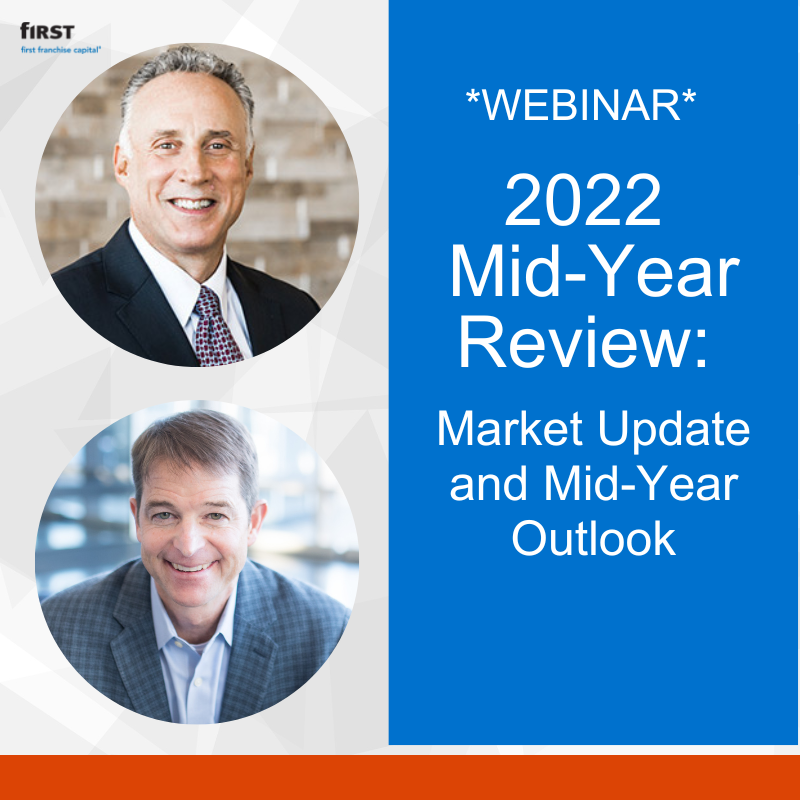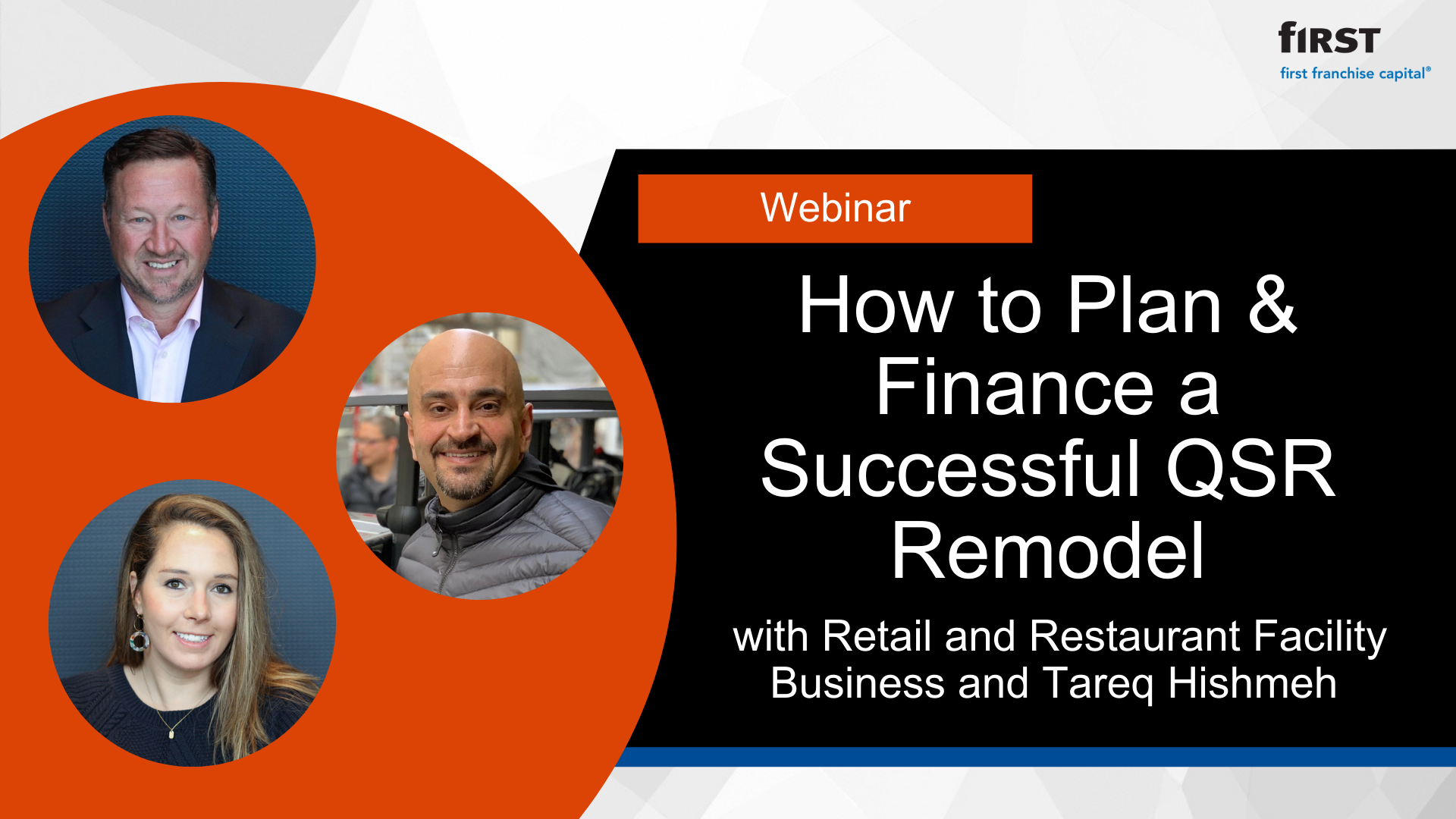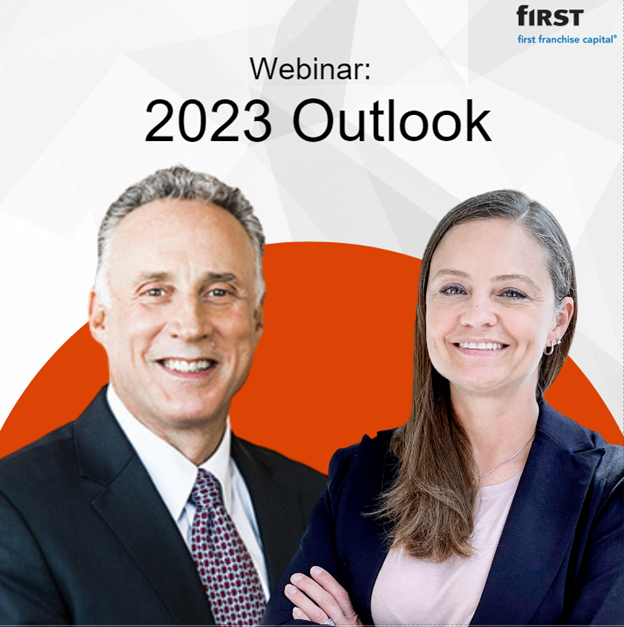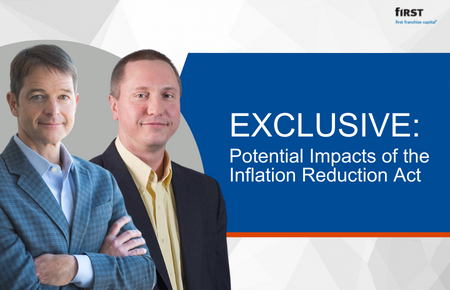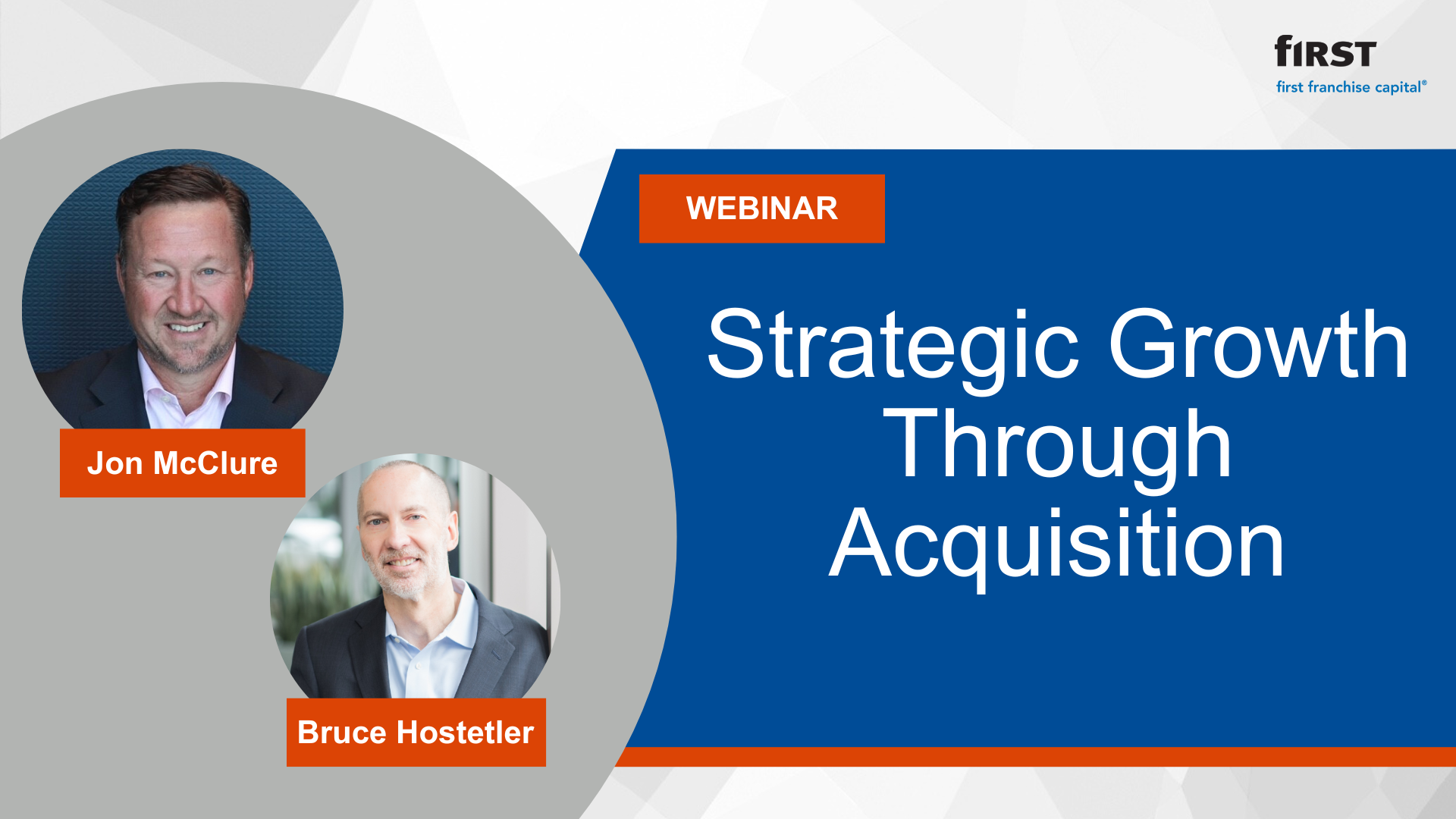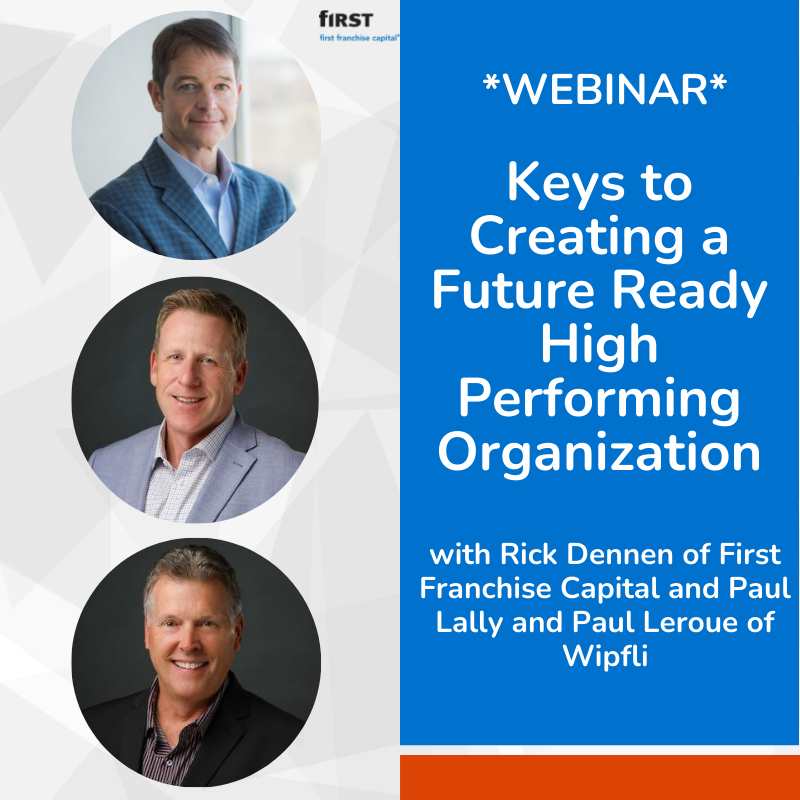2022 Mid-Year Review: Market Update and Mid-Year Outlook
- 0.5
- 1
- 1.25
- 1.5
- 1.75
- 2
Bridget Haight: Hello, everyone, and thank you for joining us today. I am Bridget Haight, host and moderator for Oak Street Funding webinars and podcasts. Today, I am happy to be joined by Rick Dennen and Marc Chandler. Rick is Chief Commercial Banking Officer at First Financial Bank, which includes being CEO of Oak Street Funding and First Franchise Capital. Marc is Managing Director and Chief Market Strategist at Bannockburn Global Forex. Marc and Rick will be discussing the decisions and implications from the Federal Reserve meeting, and will look back on the beginning of the year and provide an outlook for the rest of 2022. Rick, Marc, thank you for joining me and taking the time.
Rick Dennen: Thank you, Bridget. You're welcome.
Bridget Haight: Hi, Marc.
Marc Chandler: Thank you.
Bridget Haight: We'll just jump right in. We've got a lot of questions for you. Marc, can you provide a general overview of what the Fed just decided?
Marc Chandler: Sure. With a big move today, the Federal Reserve, for the second meeting in a row, hiked the key interest rate by 75 basis points. This is the second move in a row. The implication, of course, is the Federal Reserve is trying its best to curb inflation pressures, and without, of course, driving the economy into recession.
Bridget Haight: Got it. That leads me to ask a follow- up question. This is for you, Rick. Does the increasing interest rate environment worry you that clients with variable rates will have trouble repaying their debts?
Rick Dennen: You really have to take portfolio by portfolio or industry to analyze that. I think from a commercial perspective, no. I think the way that we evaluate financial statements and put covenants and even stress- test different interest rates... When you know you've got this rising interest rate environment, you're going to stress- test them at 100 BPS and 200 BPS to see how their performance is and what their coverage ratios are in that environment. I think from a commercial perspective, really not concerned, because our portfolios are not overleveraged. They're really in good shape and in good industries. From a consumer perspective, if you get to a tighter, higher- risk auto portfolio, something along those lines, yeah, I think these interest rates, and not just interest rates, but also the inflationary things like gas and energy costs and things like that, can have such an impact that you might see some defaults on some consumer portfolios.
Bridget Haight: Sure. Okay.
Marc Chandler: I was thinking, too, about this. It reminds me of Studs Terkel. He was this oral historian. He wrote a book about the Great Depression, but he didn't call it The Great Depression. He called it Hard Times, because for most Americans who didn't really enjoy the boom of the'20s, the Great Depression was just more hard times. I think a lot of businesses were struggling before COVID, before the inflation surge, and so I think for small and medium- sized businesses, that are the backbone of the country, are used to these adverse conditions and go from one set of hard times to another set of hard times.
Rick Dennen: Yeah. I don't disagree with you, Marc, at all. We probably haven't seen it in our lifetimes with this combination of pandemic, high inflation, a war, all these different variables that impact our economy and what it might do. There's a lot of people that say they can predict it, and that's great, and there's a bunch of models that I think... I saw a number yesterday, Marc, that said 44% of our models are predicting a recession, however that's defined today. I think you're right. These are hard times. The pandemic was a hard time, and we've just got to work through it. I think the consumers overall are going to feel a little bit more stressed or pinched than the commercial customers that we have, from a banking perspective.
Marc Chandler: Yeah. I think we're seeing that pinch to the consumer, I know in my household, and I know a lot of other people. You're looking at what it costs just to feed a family. But for the first time, we're seeing some wage increases. For the first time in many years, we're seeing something above 5% year- over- year increase. I think that's true. I see the consumers in the U. S., what we're seeing, I think, is to make ends meet without wages keeping up with inflation, we're seeing, I think, consumers borrow from the past. How do you borrow from the past? You draw down your savings. You take equity out when you refinance your house. But they're also borrowing from the future. By that I mean credit card use. We're going to get a new report later this week or next week about consumer credit and revolving credit. Basically, everyone is saying three months this year, say February, March, and April, American consumers grew their credit card debt faster than they did all of last year. This, to me, is one of the last gaps. How do we make ends meet? Well, first, we borrow money from the past or the future, and then we cut back on consumption. I think that's part of what Powell's message was today, seeing a slowdown in household consumption, perhaps, he suggested, the early signs of it.
Bridget Haight: Great. Not only are there rising rates, but the world is also experiencing instability. Since the dollar is unusually strong right now, Marc, what is your view of when the dollar will begin its trend downward?
Marc Chandler: Yeah, what a great question. It's one of those things that it's hard to... Of course, it's hard to know these kind of things. What I look at and try to help our clients navigate is, what are the early signs? One of the early signs, I think... Why is the dollar strong now? Partly because of this geopolitical tension, but also because the Federal Reserve has been aggressive about raising interest rates. To me, the dollar turns around the time when the market sees a Fed rate cut. And when does the market see a Fed rate cut? It's interesting. The Fed is not done hiking rates. That was clear from today's Powell press conference. The Fed is going to be raising rates. We're probably looking at another 100- basis- point increase before the end of the year. Even with that, I think the market knows that the more the Fed raises rates now, the more it brings forward the economic slowdown. The market right now is pricing in about 50 basis points' worth of cuts in the second half of next year. My guess would be that the dollar, which, to your point, it's as strong as it's ever been by various measures. But just even within our lifetimes, we've seen in the past couple of weeks the Japanese yen fall to 22- year lows, the euro at 20- year lows. This is a great time to be a tourist and go to Europe for Americans, and go to Asia. But I think that this time of a very strong dollar, we're probably at the tail end of it. Sometime towards the end of this year, early next year, the strength of the dollar will begin fading as the market brings forward the Fed rate cut.
Bridget Haight: Great. Thank you. To follow that, Rick, what actions can our borrowers who buy or sell product from overseas do to position themselves for a pending decline?
Rick Dennen: I'm not an expert in this, but there's different derivative- type products that you can do to hedge, whether it's a forward contract on supplies and materials that you're needing to interest rate swaps and derivatives. To me, it really comes down, over the years talking to CFOs, in their belief in what they're reading and what the Fed is doing, and how they react to it. Some are so focused on their business that they don't really want to get into that. Others want to be very preventative and hedge any downside risk. They will pursue and hedge interest rates, hedge the dollar, and put forward flows in place and things like that. There's a lot of different things you can do. You've got to understand the accounting of those, how they go on your balance sheet and how they continue to be updated, and the effect going forward. Marc, I don't know if you've got any insights or thoughts there on managing through that dollar-
Marc Chandler: You mentioned a very important point, I think, that gets obscured, I think. Maybe it's the gamification. Maybe it's Robinhood. Maybe it's the people who buy stocks on their cell phone. But I think that the capital markets are not just about speculation. A lot of our clients, I'd say all of our clients, see the foreign exchange market or the commodities market not as a place to speculate and guess which way the markets are going, but really to hedge themselves. It's really much more of an insurance policy. A company is buying a German machine tool, and they don't get delivery for three months. Can't they lock in the price today, the price, the exchange rate? Same thing we do with interest rates. If you borrow a floating rate, maybe you want to lock it in. Different ways to use the financial markets, not as a place to gamble and speculate and try to make money quickly, but really to offset and manage the risk. I think that that's what I find among business people as well as investors. It's really managing that risk, whether it's commodity price risk, interest rate risk, currency risk. These are business risks that can be managed. Of course, a lot of the risk that businesses face is difficult to manage, but these financial- type risks are manageable.
Bridget Haight: War is not the only instability causing disruption. We still can't say that we're fully past the effects of the pandemic. Marc, what changes in terms are you seeing given the current market cycle on the heels of COVID?
Marc Chandler: Yeah, what an unprecedented time, the idea of a pandemic with such large capital markets, such size of the economy, these scales of disruption. Oftentimes, you really can't forecast the future very well. Nobody can, these uncertainties, the supply chains, how long they get disrupted for. The war adds another level of uncertainty. What's interesting, what we saw is that... We think about risk in the market as, really, a question of volatility. Even recently, in the last few weeks, the volatility of the bond market was higher than it was in March 2020, when COVID first struck, and so just to appreciate these huge moves that take place. Partly, these huge moves take place because of that uncertainty. I'd say that's really one of the takeaways from our recent experiences. The degree of uncertainty remains elevated, not just uncertainty of new subvariants of COVID on the rise in the U.S. and Asia and Europe, how Russia weaponizes oil and gas, what they do after they have an agreement that gets food out of Ukraine. I think there's so many uncertainties. Of course, we've got uncertainties on U. S. policy, the corporate tax reform, a lot of unknowns. I think that keeps the market on edge and without a lot of conviction.
Rick Dennen: Yeah. I tell you, I've read Marc, a lot on that supply chain. You think about, "Well, that'll be over. The government will get involved." Number one to me was how quickly that creeped up on us during the pandemic. The second side of that is how long it's taken to clear out. You had this no demand in the beginning, then hyper demand, after the stimulus money came out, in needs and things like that. It really hasn't gone away yet. I know lumber is down 27%. Steel is still up. It's product by product. You see the ships that are off ports that can't get unloaded. It's just hard for me to believe that that hasn't been figured out yet with all the efforts. It's been two years now.
Marc Chandler: I think Warren Buffett said it about investors, "When the tide goes out, you see who doesn't have a swimsuit." I think the same thing, too, now. For a long time, a lot of the large businesses in America were paying back shareholders, buybacks, dividends, and they really underinvested. A supply chain disruption that we had in the U.S. that had nothing really to do with COVID per se was the baby formula. We allow companies to grow and monopolize a sector, dominate a sector, and then when something bad happens, which, of course, so many moving parts, the odds are something bad is going to happen sooner or later, that we're ill prepared with this with not excess capacity. Businesses, I think, have done a disservice who have underinvested in capacity, but that's what shareholders have demanded.
Rick Dennen: Yeah, or the other one, chip capacity. You think about the automobile industry. It's not monopolized, but yet the number of chips... I think I read somewhere where there's 2,000 or 3,000 chips that go into a Ford F-150. The number of chips needed to get out to cars, the monopoly there probably would be in the chip manufacturer. There's just not enough of them. You get one little disruption, and it hasn't been fixed.
Bridget Haight: Dominoes.
Rick Dennen: It takes time to fix.
Marc Chandler: One of the scary things I think right now is, and maybe it had to do with our inflation story as well, if we want to be, for national security reasons, want to produce our own chips, the largest chip manufacturer in the world said they're happy to build plants in the U. S, they're going to get some government subsidies to do it anyways, but they say the cost of producing those chips in the U. S., at least in the beginning, 50% higher than doing them where they're doing them now, Asia.
Bridget Haight: Wow.
Marc Chandler: As our businesses try to deal with the supply chain shock, with the growing tensions with China, and move production into the U. S., re- onshoring it, that's another factor that people think might be underpinning inflation in the medium term, unwinding of some of the benefits that we had from globalization. On the eve of the pandemic, the U. S. was importing something on the magnitude of 90% or 95% of our antibiotics from China.
Bridget Haight: Oh, wow.
Marc Chandler: That doesn't make any sense. And the same thing from China's point of view. They're held captive to two operating systems that the U. S. controls, iOS and Android. They, too, have to free themselves as the geopolitical tensions rise. The globalization, which helped lower prices, lets me eat tomatoes year round or strawberries year round, that's great globalization, but it's beginning to unwind. We get more concerned about the environment, geopolitics.
Rick Dennen: I'm going to add a follow- on question there. Do you see a lot of companies that, over the long term... For 20 years, companies were pushing manufacturing offseas. Marc, do you see a lot of that coming back to the U. S., even though it's not going to be as cost- effective, and that being able to be passed on then to commercial and consumer customers?
Marc Chandler: Yeah, great question. I think there's two big trends. One is called onshoring, and the other is nearshoring, or friend- shoring. We see a lot of anecdotal reports about companies that initially moved from Mexico to China, when China joined the WTO in 2001, bringing it back to Mexico. I was at a conference in Philadelphia recently, and people were talking about how important it is to bring manufacturing back to the U.S. I go along with that, but I think that there's a twist to it that we can't be naive about. In order for U. S. manufacturing to be competitive, it's not going to be able to hire a lot of people. It's got to be automated. It's got to be robotic. It's got to be the computer- aided manufacturing, computer- aided design. It's like on the floor of the New York Stock Exchange, it used to be a lot of noise, people yelling and screaming. Now you can hear a pin drop sometimes because everything is being done on computers. I think the same thing with manufacturing. Manufacturing capacity, I think, national security... Think about it. If chips are going to be important in the U. S., then things we need to make those chips, say neon gas, which is used to etch into the chips, we're going to need to be self- sufficient in that. It's really a slippery slope. I think that that kind of production that comes to the U. S. is not going to be job intensive, but it's going to be capital intensive.
Rick Dennen: Great point. Fully agree. I think a lot of the legacy manufacturing here needs to be updated. It was easier to offshore it than it was to put the capital in, rehire the employees that are going to be at a higher base, and just push it off. I do, as well, see that it will come back to the U. S., and I think it'll be positive. This stuff ebbs and flows. I think that's what we're going to see for the next five to 10 years or so.
Bridget Haight: If we're going to move beyond the current environment, let's ask... We are heading into the second half of 2022. As we mentioned, disruption is a key term for business owners and consumers this year. Marc, given your experience in past market cycles, what is your outlook on the second half of 2022?
Marc Chandler: Yeah, I think we've only had a brief taste of it in the last month or so, maybe couple of months, but I think, of course... I grew up in Chicago, and I'm still a Cubs fan. There's a sort of optimism. They've won one time in 100 years. I like to be optimistic. When I look in my crystal ball, so to speak, for the next six months to a year out, I just think that we have a lot more trouble ahead of us, weaker economy. Maybe inflation comes off, but I think that this 3. 6% unemployment rate is going to go up. I think it's going to be harder for a lot of American families to make ends meet. I think that we're in for a tough time here ahead of us. I think that the... I think it's going to be a very challenging time for households, for small, medium- sized businesses. I think that a combination... It's not just that the Federal Reserve is tightening policy, but it's also that the federal government is cutting back too. I know a lot of us like small deficits, but we want to be able to do it in a measured way. Here's what's happening. The budget deficit last year was about 10 and a half percent of GDP. This year, it's going to fall to about four and a half percent of GDP. So we've got monetary tightening and fiscal tightening. I think that this is a recipe for, like Powell had said, the Federal Reserve chairman, the road to a soft landing for the economy after that big boom is getting narrower and narrower. I guess what I'm suggesting to our clients, to my friends and family, is that we should be prepared for worse times. That means boosting savings if we can. It means beginning to watch... I see a lot of Americans already doing it, shifting from brand names to generic names, the local store names, a lot of ways to begin preparing for what's likely to be a tougher time for the next six to 18 months.
Bridget Haight: Looking at student loans kicking back in too. They took a big break from that, and now payments are coming back into effect. I'm already nervous.
Rick Dennen: Well, that, and then all the housing boom that has occurred and the repricing of ARMs that's going to come due. I think that impact, if you couple that with the energy cost, that could be hundreds of dollars of months to the consumer.
Bridget Haight: Rick, how do you predict all the disruptions will impact M&A?
Rick Dennen: We've talked about all these disruptions. I think you try to predict any combination and what's going to happen, and we haven't seen it before. There's a lot of capital in the markets, in my opinion. We have seen in certain industries, in the insurance and the RA sector, record M&A in the first half of this year. If you look at these rates historically, even with the 75 BPS increase today, these rates are nowhere near approaching our max. They're probably closer to our minimums than they are our maximums. I think there's still opportunities for things to occur, M&A to occur. I think the dollars that have to be deployed will get deployed, and I think M& A activity will occur. It may occur at a slower rate, and valuations may have to come down a percent of that in order to compensate for the additional expense that's going to be occurred. If it's PE funds that's driving a lot of this, well, they do the acquisitions with a lot of leverage. These rates do impact them, but maybe it's just a reduced purchase price. I would think that there's going to be a slowdown in the second half of the year to the records that have existed in certain industries today, but it's certainly not going to halt.
Marc Chandler: Yes, I would just say, too, that it does seem, to Rick's point, that M&A activity seems to be procyclical. When the economies are strong, more activity; when the economy is weakening, less activity. The one thing I think that's a promising area is, as I was mentioning, the dollar hasn't been this strong for more than, say, two decades. What this means is that for U. S. companies, and even PE firms looking to add on buying another asset, that Europe and Asia offer very attractive opportunities, because not only do you get the valuation, but you also get a very strong dollar. The likewise happens too, is that those European and Japanese companies that might have assets in the U. S., they might be looking to sell them and take their profits with the dollar this strong. Again, I say this strong. One way we think about... When you think about the value of a company, there's more or less agreed- upon models how to value a company. Maybe it's free cash flow, replacement costs, all those kinds of models. In a currency, it's not so easy because currencies aren't backed by anything except the good faith of the government, whatever that really means. What we've come up with is this thing called purchasing power parity. It's the idea that an international basket of goods could trade for the same price. You're probably familiar, within Economist magazine, the Big Mac. To the extent that the Big Mac costs, say, more in Europe than it does in the U. S. means that there's a currency mismatch. By that measure, the Organisation of Economic Co- operation and Development, this club for large, rich countries, they have their own model for this purchasing power parity, which isn't such a tough concept. It's sort of like... My wife wasn't home the other night, and I was watching these mixed martial arts, these fights on TV. They said this one small guy was actually stronger than one of these big guys. How can that be? They saw pound for pound. That's sort of purchasing power parity. This OECD model has the euro and the Japanese yen, the British pound the most undervalued ever. I shouldn't say ever, but 30 years, a long time for me, so it seems like forever. For most of our career, these currencies are as cheap as they've ever been. I think that when we see markets at such extremes, I think that often offers an opportunity for businesses who are prepared. That's what good luck is, is opportunity with preparedness.
Rick Dennen: See, we thought we were just getting an interest rate expert here, but we've got WWF integrated here as well, so thank you. Great.
Bridget Haight: Are valuation strategies any different, Rick?
Rick Dennen: Marc has talked about it. I've talked about it. I think the valuation, the strategies... The valuations, the math is still the same. That's not going to change. It's, does the price get lower? Do you continue to pay? Do you exercise a different strategy and take on a different risk? There's different things you can do. I think the valuations probably would tend to tick down just a little bit and not be as frothy in what people are willing to pay, assuming everything else holds constant, because you're going to pay more in your interest costs as you buy these companies.
Bridget Haight: Right. Okay. Marc, any additional thoughts?
Marc Chandler: No, it's just I maybe would just end it with the idea that, as smart and as astute as all these MBAs in the world and all these economists, we haven't really resolved the business cycle. Vast periods of growth are followed by slower periods and a business downturn. I think we should be prepared for that. We shouldn't deny. We shouldn't think that prices only go up, or house prices or stock prices only go up. For businesses, for households, these are risks, and they can be managed. I think that that's the key takeaway for me, is that we're going through some difficult times, and these difficult times are likely to persist for a while longer, but there's tools out there to help you manage these times.
Bridget Haight: Great.
Rick Dennen: I'm going to add a comment. I think when I was getting my master's, I had to write a paper when we were graduating about the global economy. You think about, you talking about cycles, that you would think that here we are, 20, 30 years since that occurred, but that the global economy would've solved itself out, and cycles would be eliminated because you've got the global economy, but in fact, it really hasn't as well. To me, when you think about the future, the pandemic really showed to me you've got good management teams and bad management teams, and you've got to be reactive and responsive and be listening and attentive in these businesses. In a wonderful management team, a great management team, they're going to figure it out. They figured it out during the pandemic, which they've probably never dealt with before. That's how this future is. I think it shows that you've got to be on top of your game. You've got to be nimble and willing to-
Bridget Haight: Pivot.
Rick Dennen: ...revise your strategies, yeah, and pivot on what you're doing to make sure that your businesses are successful.
Bridget Haight: Great. Yep. Rick, what is the impact that you see throughout the remainder of the year on debt sources? How does that impact compare to the impact on the stability of PE sources?
Rick Dennen: Debt sources, and I think of that... You've got banks and you've got non- bank, other financial institutions. Banks are very well capitalized. I believe that, and I think they've got the capacity to continue to put money out for the rest of the year. As I've said earlier, there's a lot of capital in the markets. I think these non- bank finance companies are well capitalized and going to be well supported. I think both of them, I would say, are looking at refining their strategies and saying, "Okay, where do we want to put our money today? What has changed? How have the business models changed? How have industries changed such that we're going to get a good return, we're going to get repaid on our debt?" I do think the sources are going to remain. Banks still need to deploy capital. PE firms need to deploy their capital. So I don't think that's going to dry up any way, shape, or form.
Bridget Haight: Okay. As our time wraps up, it is clear that our listeners, understandably, have concerns about all of these disruptions. I'd like to hear from both of you. What should small business owners focus the most on during all this disruption to set them up for a strong end to 2022 and a great start to 2023? Rick, to start us off, what are your thoughts?
Rick Dennen: I literally just talked about it, being nimble, flexible, adjusting their strategies, meeting with their management teams. It's just incumbent upon them to be engaged in their business day- to- day. You've got to be able to do that. If you're not, you're probably going to be missing opportunities. I think that existed before the inflation, before the war, before the pandemic. I think it continues. I think in today's world, those changes are happening. You've got to be flexible on these things, and you've got to react.
Marc Chandler: I agree with Rick. I think that it's kind of interesting. It's sort of like what they used to joke about on doing a PhD dissertation or something, that the questions may change but the answers don't. I think that the tried- and- true practices of business, risk management, as Rick was saying, being attentive to changing circumstances, maybe embracing the changes from the stakeholders, changing tastes, changing appetites, being aware of changing circumstances, but the basic principles about successful business doesn't really change. Prudent risk management, making a product and a service that people want to buy continuously, listening to employees, showing people respect, I think that these are the things that make businesses survive over the long run. Circumstances are changing, but these basic values, I think, tend not to.
Bridget Haight: Well, this has been very informative. Thank you, Marc and Rick, for joining us. Thank you for your-
Rick Dennen: Thanks, Mark.
Bridget Haight: ...insights. That's all the time that we have today. You will receive a link to this recording in the next few days. Stay tuned for our August webinar, where we will discuss more about the current environment while also hearing again from Rick, who will be joined by our new president, Alicia Chandler.
DESCRIPTION
Rick Dennen, Chief Commercial Banking Officer at First Financial Bank (and CEO of Oak Street Funding and First Franchise Capital), was joined by Marc Chandler, Managing Director at Bannockburn Global Forex, to discuss the current market trends, results and implications from the July 27th Federal Reserve meeting, and provide an outlook for the rest of the year. They answered the questions you submitted during registration and provided guidance to have a strong second half of the year.
Today's Guests
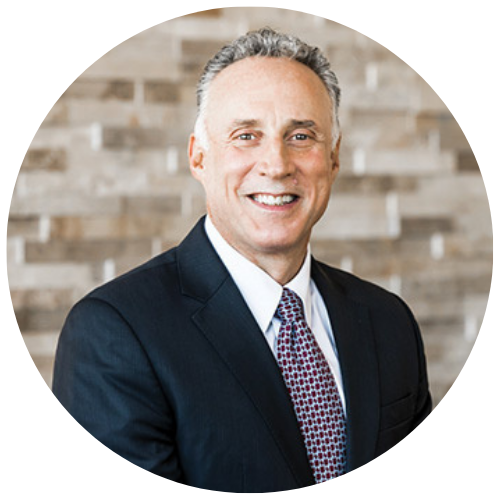
Marc Chandler
